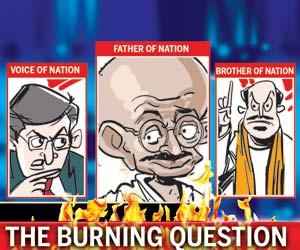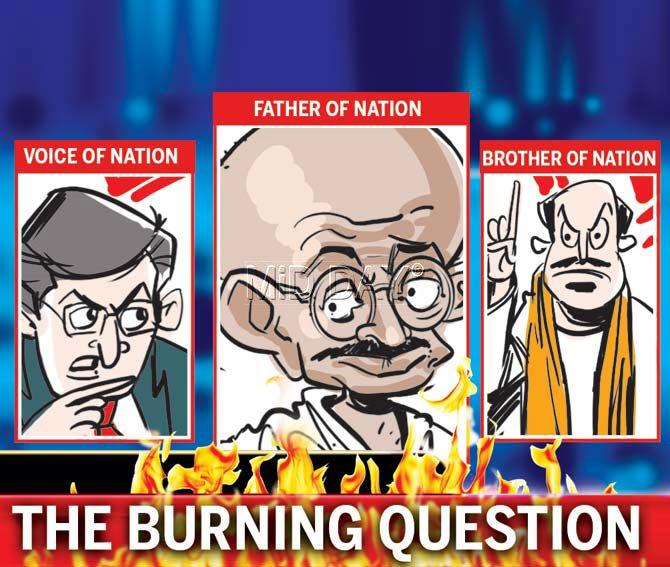Imagine a world where Gandhiji was still alive. Even if it didn't change our politics, it would at least spice up the debates on TV

If Mahatma Gandhi were still alive he'd be 148 years old, having survived countless assassination attempts by both jehadis as well as right-wing terrorists. He'd long ago have received a Nobel Peace Prize, only to have global do-gooders call for it to be snatched back after the 1992 Babri Masjid demolition or the 2002 Gujarat riots. Sabarmati Ashram would have a fridge and air-conditioning. He'd have the largest Twitter following in the world, more than Katy Perry and Barack Obama combined. He would be prolific on Snapchat. India would have stopped calling him "Father of the Nation", addressing him as "Forefather of the nation" or even "Great-great-grandfather of the nation". He would have agreed that Sachin Tendulkar is a cricketing god.

Illustration/Ravi Jadhav
ADVERTISEMENT
 Most newspapers, however, wouldn't give Gandhiji a single-column story tucked away inside. Their marketing departments would forbid it, concerned with keeping the product's content in alignment with the target segment of young readers with disposable incomes. Media owners wouldn't allow it because 70 years after India's Independence, there's no more mission to pursue but only lip-smacking profits; plus, why annoy the government of the day? The government would prefer the focus away from Gandhiji, worried he might expose its bankruptcy of talent and its drought of ideas to grow the economy; it would taunt him as a "Lutyens freedom fighter". Middle-class apoplectics would swamp the Internet with photoshopped memes and fake news about him.
Most newspapers, however, wouldn't give Gandhiji a single-column story tucked away inside. Their marketing departments would forbid it, concerned with keeping the product's content in alignment with the target segment of young readers with disposable incomes. Media owners wouldn't allow it because 70 years after India's Independence, there's no more mission to pursue but only lip-smacking profits; plus, why annoy the government of the day? The government would prefer the focus away from Gandhiji, worried he might expose its bankruptcy of talent and its drought of ideas to grow the economy; it would taunt him as a "Lutyens freedom fighter". Middle-class apoplectics would swamp the Internet with photoshopped memes and fake news about him.
Perhaps Gandhiji would be a popular panelist on TV news channels, bringing a calming presence to their shoutfests. Even the most bombastic anchors would have to pay deference to him; though given their calibre, it is more likely that Gandhiji would be repeatedly shouted down or talked over. He would no doubt have moments of lucidity and offer sage advice (which the nation would really want to know, from him) but sometimes he would be lost in the past, mistaking contemporary leaders for figures long dead. Imagine Gandhiji advising a puzzled former prime minister Dr Manmohan Singh to abjure the path of violence and socialism.
It is likely that politics would not be much different even if Gandhiji were still alive. He would forever regret how Kemal Ataturk knocked the bottom out of his Khilafat movement, ending the final time that Muslims rallied behind him; after 1921, Pakistan became an inevitability. By the 1950s, even the government in Karachi (which later shifted to the newly-constructed Islamabad) would have stopped issuing the joint passport; later, he might have found his visa applications rejected.
Gandhiji would also regret that he backed down from the fight that Dr B R Ambedkar urged him to fight, against casteist oppression and discrimination. Though Gandhiji tried to walk back his 'paternalistic' writings on the subject in the 1930s, and though he listened to Ambedkar more and more in the 1940s, it is likely that Ambedkar's 1956 conversion to Buddhism was an inevitability whether Gandhiji lived or not. Perhaps the battle against casteism, in Gandhiji's view, was futile; after all, he was never a revolutionary.
Gandhiji's fault was his pragmatism. He would have acquiesced to India exploding a nuclear bomb in 1974, though he might have resorted to penance through fasting. He might have sorted out the Kashmir issue by co-opting the Hurriyat Conference and have them renounce separatism. He might not have objected to crony capitalism, for after all, his own movement and lifestyle was maintained by the industrialists of the day.
Yet, it is also true that it was his pragmatism that enabled India to gain Independence. No one has since then been able to mobilise Indians on the scale that he did. (Tendulkar and Lata Mangeshkar might have united as many Indians, but that's not the same thing.) He used Hindu symbols and signifiers to do so; thus, he could not do war on caste. Ironically, it was the right-wing that attempted to shoot him down on October 30, 1948, blaming him for Partition and its consequences.
Gandhiji would have regretted Indira Gandhi's Emergency Rule (and might have protested alongside Jai Prakash Narayan). He might have thrown his weight behind Chandrashekhar as the prime minister after Rajiv Gandhi instead of V P Singh; he might have persuaded the communists against the historic blunder of not making Jyoti Basu the prime minister in 1996 (though that would not have altered events much); and he probably would have advised A B Vajpayee to eat less samosa and jalebi.
Gandhiji was undoubtedly as Indian as they come, the embodiment of India in all its strengths, its pride, its flaws, its faults, its successes, its failures, its culture, its traditions and its imperfections. No wonder he endures, despite intermittent efforts to kill him again and again.
Aditya Sinha's crime novel, The CEO Who Lost His Head, is available now. He tweets @autumnshade. Send your feedback to mailbag@mid-day.com
 Subscribe today by clicking the link and stay updated with the latest news!" Click here!
Subscribe today by clicking the link and stay updated with the latest news!" Click here!







